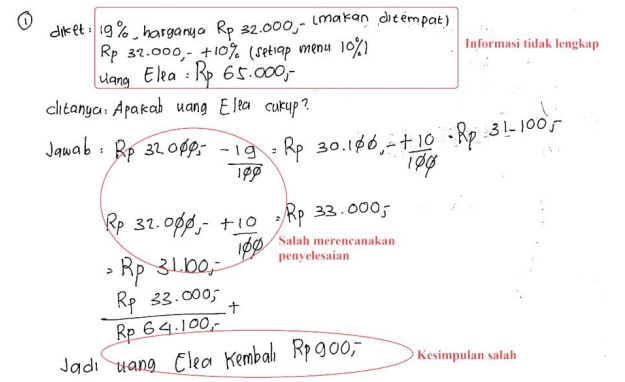Analysis of Students’ Errors in Solving Social Arithmetic Word Problems in terms of the Learning Styles
Main Article Content
Abstract
Some abilities are needed to solve word problems, one of which is the ability to understand sentences and symbols in the problem. One factor that affects the ability of each student is learning style. Learning style is a person's tendency to receive and process information to the maximum, learning styles can be grouped into three, namely visual, auditory, and kinesthetic learning styles. The purpose of this study is to analyze and describe the forms of errors made by students in solving social arithmetic word problems in terms of the learning styles. Data collection procedures in this study are giving learning style questionnaire, written test, and interview. The research subjects are two VII grade students at SMP Negeri 1 Malang from each learning styles. The results of the analysis of this research are that students with visual learning style error occurs at the step of devising a plan, carriying out the plan, and looking back. While students with auditory and kinesthetic learning style error occurs at the understanding the problem, devising a plan, carriying out the plan, and looking back. The error forms occur in all learning styles.
Article Details
Section
How to Cite
References
Permendikbud, No. 68. “Kerangka Dasar dan Struktur Kurikulum Sekolah Menengah Pertama/Madrasah Tsanawiyah,” 2013.
Robert, W. Bailey. Human Performance Engineering. New Jersey, 1989
McIntosh J. dan O’Cannor M. Problem Solving: What is it and Why is it Important?. Australian Mathematical Science Institute. 2014
Giganti Jr, Paul. Why Teach Problem Solving, Part I: The World Needs Good Problem Solvers!. CMC Communicator. 2007
Aydoğdu M. dan Ayaz M.F. The Importance of Problem Solving in Mathematics Curriculum. Journal of New World Sciences Academy, Vol (3). 2008
Hidayah, Shofia. “Analisis Kesalahan Siswa dalam Menyelesaikan Soal Cerita SPLDV Berdasarkan Langkah Penyelesaian Polya.” Prosiding Seminar Nasional Pendidikan Matematika Universitas Kanjuruhan Malang Vol. 01 (2016): 182–90.
Lesh, Richard. Applied Mathematical Problem Solving. Springer: Educational Studies in Mathematics, Vol (12). 1981
Turmadi. “Pembelajaran Soal Cerita pada Mata Pelajaran Matematika dengan Strategi Scaffolding di Kelas IV SDN Sutojayan Pakisaji.,” 2011. TESIS. Malang: Universitas Negeri Malang.
Paridjo. “Analisis Kesalahan Memahami Rumus-rumus Trigonometri Untuk Jumlah Dua Sudut,” 2002. TESIS. Malang: Universitas Negeri Malang.
DePorter, B dan Hernacki, M. Quantum Learning: Membiasakan Belajar Nyaman dan Menyenangkan. Bandung: Kaifa, 2010.
Widyaningrum, Amalia Z. Analisis Kesulitan Siswa dalam Mengerjakan Soal Cerita Matematika Materi Aritmatika Sosial Ditinjau Dari Gaya Belajar Siswa Kelas VII SMP NEGERI 5 Metro. IQRA' : Jurnal Kajian Ilmu Pendidikan Vol (1). 2016
Firdaus, Hasna P.E. Analisis Kesalahan Mahasiswa dalam Menyelesaikan Masalah Matematika Berdasarkan Gaya Belajar. Prosiding: Konferensi Nasional Penelitian Matematika dan Pembelajarannya II, Universitas Muhammadiyah Surakarta. 2017
Rosalina, Yessi. Kesalahan Siswa Kelas VII SMPN 6 Malang dalam Menyelesaikan Soal Cerita Pecahan Berdasarkan Tahapan Newman Ditinjau dari Gaya Belajar. Skripsi. Malang: Universitas Negeri Malang.2018
Sukayasa. “Pengembangan Model Pembelajaran Berbasis Fase-Fase Polya Untuk Meningkatkan Komunikasi Penalaran Siswa SMP Dalam Memecahkan Masalah Matematika.” Jurnal UNTAD Vol. 01 (2012).
Polya, G. How to solve it: a new aspect of mathematical method. 2. ed., 1. print. Princeton, NJ: Princeton Univ. Press, 1988.
Sukmadinata, Nana Syaodih. Metode penelitian pendidikan. Bandung: Program Pascasarjana Universitas Pendidikan Indonesia dengan PT Remaja Rosdakarya, 2005.
Miles, Matthew B., dan A. M. Huberman. Qualitative data analysis: an expanded sourcebook. 2nd ed. Thousand Oaks: Sage Publications, 1994.
Stanescu, Irina Mihaela. Chiang Mai, Payap University Thailand, Thailand. Exploring the Relationship between Learning Styles and Strategies for Secondary School Students in Thailand. Vol. 5 (2017).
DePorter, B dan Hernacki, M. Quantum Learning: Membiasakan Belajar Nyaman dan Menyenangkan. Bandung: Kaifa, 2008.
Soedjono. Diagnosis Kesulitan Belajar dan Pengajaran Remedial Matematika. Jakarta: P2LPTK, 1984.

